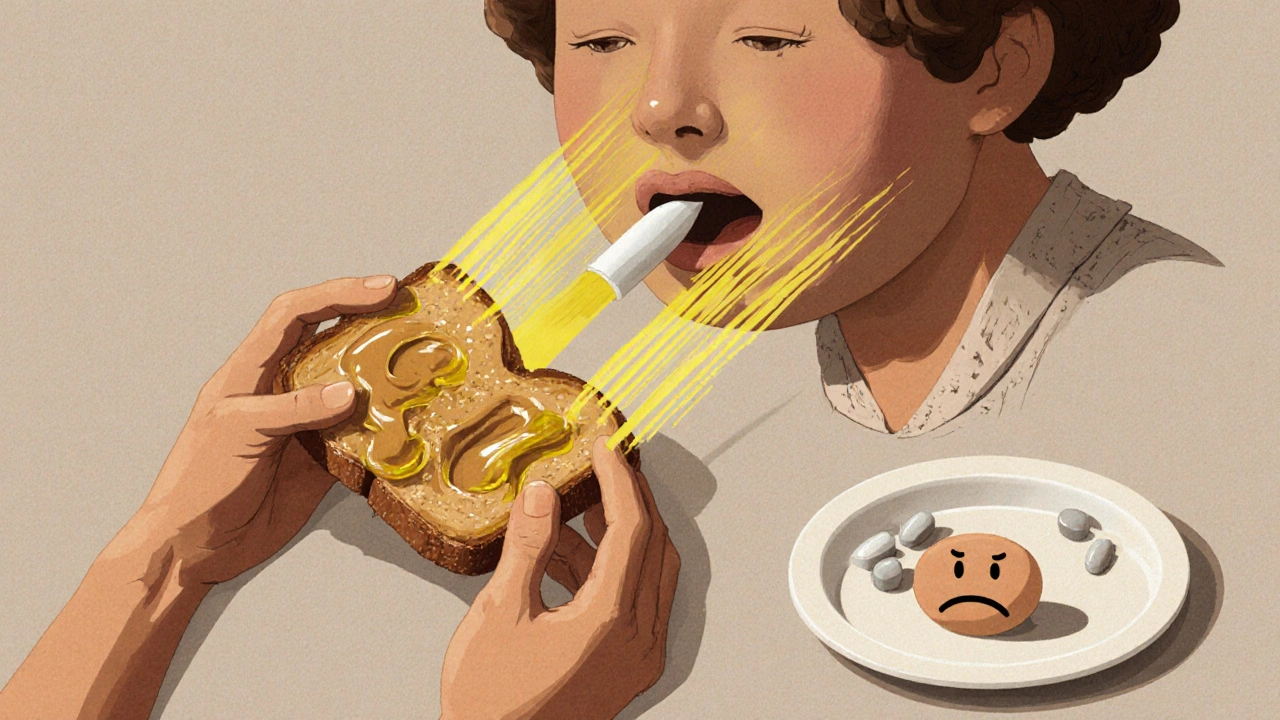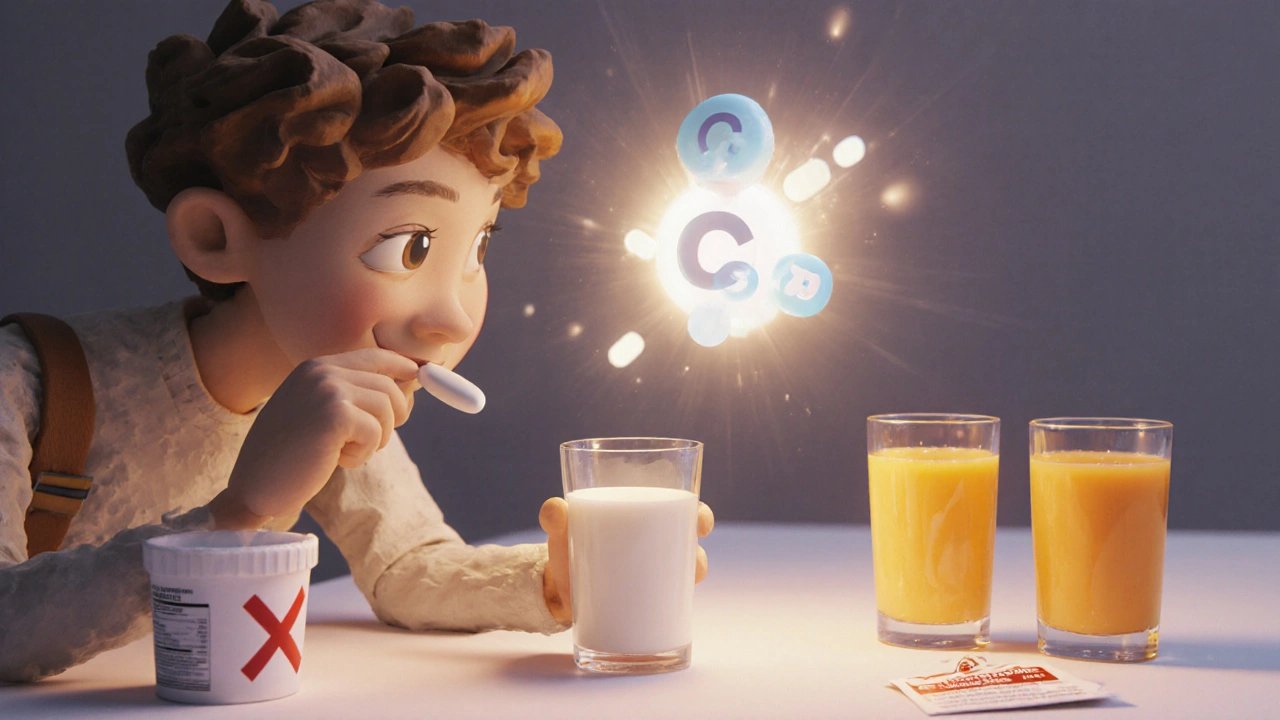Ever taken a pill and felt sick right after? It might not be the medicine itself-it could be when you took it. Taking medication with food isn’t just a suggestion. For many drugs, it’s the difference between feeling fine and spending hours on the toilet, vomiting, or worse. Around 40% of prescription medications have known food interactions that can either make them work better-or turn them into a stomach nightmare. And most people have no idea.
Why Food Changes How Medicines Work
Your stomach isn’t just a blender. It’s a complex chemical factory. When you eat, your body slows down digestion, changes acid levels, and triggers enzymes that affect how drugs get absorbed. Food can act like a shield, protecting your stomach lining from harsh drugs like ibuprofen. Or it can act like a magnet, pulling the drug into your bloodstream faster. Sometimes, it does the opposite-blocking absorption entirely.Take antibiotics like ciprofloxacin. If you take it with yogurt, milk, or calcium-fortified orange juice, the calcium binds to the drug and stops it from working. Studies show absorption drops by up to 50%. That means the infection might not clear-and you could end up back at the doctor with something worse.
On the flip side, drugs like griseofulvin (used for fungal infections) need fat to be absorbed. Take it on an empty stomach? You might as well have skipped the dose. Take it with a peanut butter sandwich or a spoonful of olive oil? Absorption jumps by 15-30%. That’s not magic-it’s biochemistry.
How Food Protects Your Stomach
Non-steroidal anti-inflammatory drugs (NSAIDs)-like ibuprofen, naproxen, and aspirin-are common culprits for stomach irritation. They block enzymes that protect the stomach lining. Take them on an empty stomach? You’re asking for trouble. Endoscopic studies show 38% of people develop tiny ulcers after just one dose without food. That number drops to 12% when taken with a meal.It’s not just about pain. That stomach damage can lead to internal bleeding, especially in older adults. The Arthritis Foundation found that 25% of people taking NSAIDs without food showed signs of microscopic bleeding in stool tests within 24 hours. That’s not something you’d feel until it’s serious.
Food doesn’t just buffer the acid. It slows how fast the drug hits your stomach. Instead of a concentrated blast of medicine, you get a slow drip. That’s why doctors tell you to take these pills with a full meal-not a cracker, not a sip of milk, but actual food. At least 250-500 calories. That’s the FDA’s standard.
The Dangerous Exceptions: When Food Makes Things Worse
Not all drugs play nice with food. Some need an empty stomach to work at all.Levothyroxine, the standard treatment for hypothyroidism, is one of them. If you take it with breakfast-especially if it’s fortified with calcium or soy-it absorbs 30-55% less. That means your thyroid levels stay low, you stay tired, your cholesterol stays high, and your doctor keeps raising your dose. A Cleveland Clinic survey found that 57% of patients admitted to taking it with food. Nearly a third needed higher doses because of it.
Then there’s grapefruit juice. It’s not just citrus. It’s a silent drug killer-or amplifier. Grapefruit blocks an enzyme in your gut called CYP3A4 that normally breaks down certain medications. When that enzyme is blocked, drugs like cyclosporine, simvastatin, and some blood pressure pills build up to dangerous levels. One glass of grapefruit juice can keep that enzyme shut down for 72 hours. That means even if you drink it at breakfast and take your pill at night, you’re still at risk.
Simvastatin levels can spike 9 to 15 times higher with grapefruit juice. That’s not a side effect-it’s a potential heart attack. Pravastatin? No problem. The difference between statins matters. If you’re on one, ask your pharmacist which kind.

What About Antidepressants, Antibiotics, and Blood Thinners?
Antibiotics aren’t all the same. Macrolides like erythromycin need acid to dissolve. Take them after eating? The food neutralizes your stomach acid. The drug doesn’t break down. It passes through unused. Take them 30 minutes before a meal-then they work.Fluoroquinolones like ciprofloxacin? Avoid dairy, antacids, and iron supplements for at least 2 hours before and after. Calcium, magnesium, aluminum-they all bind to these drugs and make them useless.
Warfarin, a blood thinner, is tricky. It doesn’t interact with food the same way. But vitamin K-found in spinach, kale, broccoli, and Brussels sprouts-directly counteracts it. If you eat a salad every day, your INR stays stable. If you skip it for a week? Your blood gets too thin. Eat a big bowl of greens after not having any? You risk a clot. Consistency matters more than avoidance. The key is eating the same amount of vitamin K every day, not avoiding it.
Antipsychotics like clozapine? High-fat meals can increase blood levels by 40-60%. That means more drowsiness, more dizziness, more risk of falls. For elderly patients, that’s a fall waiting to happen.
Real People, Real Mistakes
It’s not just theory. Real people make these mistakes every day.On Reddit’s r/Pharmacy, over 1,200 people shared stories about methotrexate. Seventy-eight percent said taking it with food cut their nausea in half. But 22% said they felt worse-because the food slowed absorption too much, making the drug less effective.
Drugs.com analyzed 15,000 reviews of metformin, a common diabetes drug. Sixty-three percent said they had severe nausea and diarrhea when taking it on an empty stomach. Only 18% had those issues when taken with food. The fix? Simple. Eat first.
But here’s the scary part: a Mayo Clinic study found that 68% of patients over 65 had no idea their meds needed food timing instructions. Only 22% got any guidance from their doctor when they were prescribed the pills.
And it’s not just older adults. Younger people skip instructions because they think it’s “just a suggestion.” But when you’re on five or six meds, and some need food, some need empty stomach, and one can’t touch grapefruit-it gets messy.

How to Get It Right
There’s no one-size-fits-all. But here’s how to avoid the worst mistakes:- Read the label. If it says “take with food,” don’t take it with a sip of coffee. Eat something substantial. If it says “take on an empty stomach,” wait at least an hour before eating, or two hours after.
- Ask your pharmacist. They’re trained for this. Don’t assume your doctor explained it. Pharmacists see hundreds of these mistakes every week.
- Use a food-drug chart. Many hospitals now use color-coded systems: green for “must take with food,” red for “must take alone,” yellow for “flexible.” You can find printable versions online or ask your pharmacy for one.
- Track your meals and meds. Apps like Medisafe let you log when you take pills and what you ate. They send alerts if you’re about to mix a drug with a risky food.
- Be consistent. If you take your blood thinner with spinach, keep eating spinach. If you take your statin with grapefruit, stop. But don’t switch randomly.
The Bigger Picture
Food-drug interactions cost the U.S. healthcare system over $177 billion a year in hospital visits, ER trips, and extra prescriptions. That’s not just money-it’s suffering. And most of it is preventable.Technology is catching up. In March 2024, the FDA approved the first “smart pill” that tracks when you take your medicine and whether you’ve eaten. CVS and Walgreens now flag food interactions automatically when you pick up your prescription. AI apps can tell you if your morning smoothie will mess with your blood pressure drug.
But tech won’t fix what people don’t know. The real solution is simple: talk. Ask your doctor or pharmacist: “Should I take this with food? What should I avoid?” Write it down. Put it on your fridge. Share it with a family member.
Medication isn’t just about the pill. It’s about when, how, and with what you take it. Getting it right doesn’t just reduce side effects. It saves lives.
Can I take my medication with just a glass of milk?
No, not for most medications that require food. A glass of milk is not enough. The FDA defines "take with food" as at least 250-500 calories. That means a small meal-like toast with peanut butter, yogurt with granola, or a sandwich. Milk alone can actually block absorption for certain antibiotics like ciprofloxacin or tetracycline. Always check your specific drug’s instructions.
Why can’t I take my thyroid pill with coffee?
Coffee, even black coffee, can reduce the absorption of levothyroxine by up to 55%. It’s not just caffeine-it’s the compounds in coffee that interfere with how the drug enters your bloodstream. The best practice is to take your thyroid pill with water first thing in the morning, then wait at least 30-60 minutes before drinking coffee or eating anything.
Is it okay to take painkillers with a snack if I don’t have a full meal?
For NSAIDs like ibuprofen or naproxen, a small snack like crackers or a banana is better than nothing-but not ideal. The goal is to coat your stomach lining and slow drug release. A full meal with protein and fat works best. If you can’t eat a full meal, at least have something substantial. Never take these on an empty stomach, even if you think you’re fine. The damage can be silent until it’s serious.
Can I eat grapefruit if I’m not taking any meds?
Yes, absolutely. Grapefruit is healthy and safe if you’re not on medications that interact with it. The problem isn’t the fruit-it’s the combination with certain drugs. If you’re unsure, check your medication list with your pharmacist. If you’re on statins, blood pressure meds, or immunosuppressants, avoid it. If you’re not, enjoy it.
What if I forget and take my pill with the wrong food?
Don’t panic. One mistake won’t usually cause harm. But don’t double up on your next dose to make up for it-that can be dangerous. If you took a drug that needs an empty stomach with food, wait until your next scheduled dose and take it correctly then. If you took a drug like ciprofloxacin with dairy, call your pharmacist. They can advise whether you need to reschedule or if it’s safe to continue as planned.
Do over-the-counter meds need food timing too?
Yes. Many OTC drugs have food interactions. Iron supplements, some antacids, and even certain pain relievers like naproxen can irritate your stomach if taken without food. Always read the label on OTC meds. If it says "take with food" or "may cause stomach upset," follow it. Just because it’s available without a prescription doesn’t mean it’s harmless.
Next Steps: What to Do Today
1. **Look at your medication list.** Grab your pill bottles or app. Check each one for instructions about food. If it says “take with food,” “take on empty stomach,” or “avoid grapefruit,” write it down. 2. **Call your pharmacist.** Ask: “Are there any food interactions I should know about for these meds?” Most pharmacies offer free consultations. 3. **Set a reminder.** Use your phone to alert you when to take each pill-add a note like “take with breakfast” or “wait 1 hour after eating.” 4. **Talk to someone.** Share this with a family member or caregiver. If you’re managing multiple meds, you don’t have to remember it all alone. 5. **Track your symptoms.** If you’ve had nausea, dizziness, or unusual fatigue after taking a pill, note what you ate. That info could help your doctor adjust your plan.Small changes in timing can make a huge difference. You don’t need to be a scientist to get this right. Just pay attention. Your stomach-and your health-will thank you.

